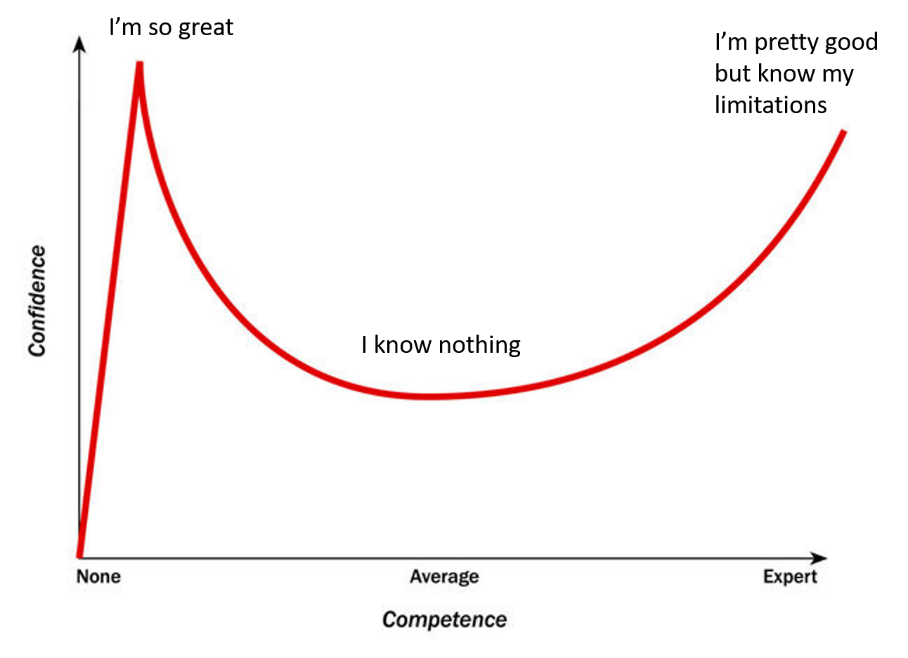There’s a saying that goes, “Shoot for the moon. Even if you miss, you’ll land among the stars.”
The quote is the perfect segway into the topic of today’s blog—why your real estate team’s goals are too small.
Because the truth is, if the goals you are creating are too small, they won’t be big enough to drive any real growth in your business.
When setting goals, psychology matters
We’ve all been there. A few days before New Years, we break open a notebook and write down our goals for the upcoming year. But how often do we actually follow through?
One study found that only 19% of people that set New Year's resolutions actually reach the goals they set. Why is this?
Humans are often overly-charitable with assessing our own goals. Not only that, but we do the exact same thing with our abilities. Some may have heard of the Dunning-Kruger effect, a cognitive bias in which people with limited knowledge believe that they are smarter and more capable than they really are.

But when it comes to the psychology of setting goals, there are two main trains of thought.
The first is going for the “mission impossible”
A good example of this is setting the goal of getting an A in every single class, despite hardly receiving many As in previous years.
Those who choose “mission impossible,” believe that even if they don’t achieve exactly what they set out to achieve, they will probably get far better results than if they had set a “modest” goal instead.
The second is setting modest, attainable goals
This philosophy is all about the small wins.
For example: You had a goal to run 10 miles a week, but you only averaged 7; even though you didn’t reach your goal, you made progress. It's proof that you’re capable of moving the needle.
You achieved something, so celebrate!
Many know this as the Progress Principle, which states that progress contributes to positive emotions, strong motivation, and helps boost productivity.
Which goal-setting philosophy is the most effective for real estate teams?
While both philosophies have their merit, in the business world, there’s one that may give your real estate team an edge.
A modest, attainable goal like “increase sales 10%”, will inadvertently cause you to work 10% harder. If you and your team do this long enough and you don’t make huge progress, everyone will end up feeling burnt out.
Instead, setting a “mission impossible” goal like “doubling sales” is going to require you to dramatically change the way your team works. Here’s what this might look like:
- Set up an ISA department
- Streamline your transaction process
- Overhaul your marketing
- Delegate tasks so that you can focus on high-value activities
- Hire more people and grow your team
These goals are more compelling, more fun, and unlock more creativity if you and your team can get behind them.
Break down your real estate team’s big goals into smaller pieces
The “mission impossible” philosophy of setting goals will certainly get your team more bang for your buck.
But who says you can’t have the best of both worlds?
You can take your “mission impossible” goal and chunk it down into manageable, bite-sized pieces. This makes the process feel less overwhelming and sets a clearer path to achievement.
Visualizing the end goal will give your real estate team a true north
You and your team should become experts at visualizing and imagining how you will feel when goals are met.
For example, the goal to “buy a sports car” is vague.
On the contrary, if I want to create crystal-clear imagery of my goal, it would be a list like this:
- A black Porsche with black rims
- A panoramic sunroof
- 400 HP twin-turbo V8 engine
- A red seat belt that makes a distinctive “click” when you sit in it for the first time

These types of visualizations have a lot more meaning behind them, and they speak to your brain in a way that’s motivating.
But how about your real estate team’s goals? What does a crystal-clear goal look like?
How to set crystal-clear goals for your team
We all know real estate is a relationship business. There are many people involved in a single transaction and many more moving parts.
The downside of a complex industry is that it oftentimes (makes you believe) that the tracking technologies needed to make your business grow should be complex too.
That couldn’t be further from the truth. Your agents probably spend hours (or even days) on manual data entry, duplicating data between clunky, disparate systems.
How can they work on achieving their goals when they’re nose-deep copying info from a lead form into Excel? Or updating project management software when they’ve set an appointment or closed on a house?
They can’t.
One standout capability of Sisu’s platform is the ability to take big goals and break them down into small, manageable pieces.
The goals are smoothly integrated with the day-to-day workflow of your real estate team. Giving you crystal-clear steps you can take to grow your business.
Take this example from the Sisu dashboard:

Conversations > Buyers Appointments Set > Buyer Appointments > Buyers Signed > Buyers Under Contract > Buyers Closed (these goals are duplicated below for listings as well)
The ability to log in and actually see down into the details of your goals; how close you are, where you can improve, and which battles you’ve already won—makes all the difference when it comes to your real estate team’s motivation and morale.
Understand the difference between your goals versus your agents’ goals
It’s paramount to focus on your agents’ goals more than your own.
Think of this as positive accountability. By helping them reach their goals, it subsequently helps you reach YOUR goals.
In the long run, this mindset turns you into a different type of leader.
If your agents’ goals aren’t big enough to help you reach your personal goals, the solution is to focus on recruiting and hiring more agents.
Note: Sisu actually already has a recruiting and onboarding add-on that works seamlessly inside the platform.
Final thoughts on setting goals for your real estate team
To summarize why your real estate team’s goals are too small:
- When setting goals, psychology matters
- Break down big goals into smaller pieces
- Visualize the end goal to create a “true north”
- Set crystal-clear goals to heighten motivation
- Understand the difference between your goals vs. your agents’ goals
Here at Sisu, we want you to reach both your current and future goals.
If you’re already on the platform, take a look at our goal calculator. It not only helps you create monthly and yearly goals, but it copies those goals directly to the “Goals” screen in Sisu so you don't have to manually enter them.
On the other hand, if you aren’t with Sisu and want to learn more about how our technology can help you reach your real estate team’s goals, request a demo today.








.png)



